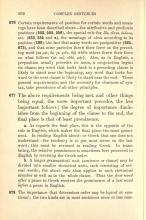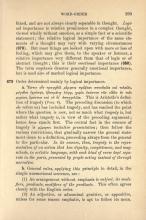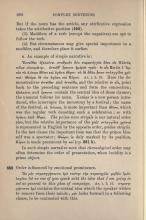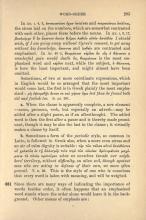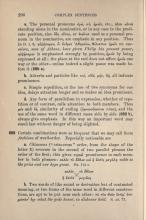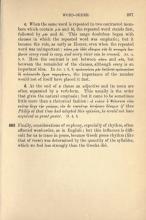674. Each language has its own ways of arranging words within the sentence, ways natural to the native speaker, but more or less strange at first to others. English, Greek, Latin, French, German, all differ considerably from one another in word order. The following sections describe the more striking differences between Greek word order and English.
675. The order of words in Greek is much freer than in English, because Greek has fuller inflections. Thus the boy saw a man means one thing, a man saw the boy means another, saw a man the boy means nothing; but the Greek could say ὁ παῖς εἶδεν ἄνδρα, ἄνδρα εἶδεν ὁ παῖς, εἶδεν ἄνδρα ὁ παῖς, or ἄνδρα ὁ παῖς εἶδεν, all with equal clearness, with no change in syntax or essential meaning, but merely with different emphasis. In English the word order is the most important means of indicating syntax; in Greek it serves this purpose to a far less extent, but is the chief means, along with particles, of indicating what we call rhetorical effects.
676. Certain requirements of position for certain words and meanings have been described above--the attributive and predicate positions (§§ 552, 555, 556), the special rule for ὅδε, οὗτοs, ἐκεῖνος, etc. (§§ 553, 554 and a), the meanings of αὐτός according to its position (§ 199), the fact that many words are postpositive (§§ 665 – 673), and that some particles throw their force on the preceding word (as μέν, δέ, γε, γοῦν, δή) while others throw their force on what follows (as καί, οὐδέ, μήν). Also, as in English, a preposition usually precedes its noun, a conjunction begins its clause, any word that looks back to a preceding clause is likely to stand near the beginning, any word that looks forward to the next clause is likely to stand near the end. These general requirements, and the necessity for clearness of syntax, take precedence of all other principles.
677. The above requirements being met, and other things being equal, the more important precedes, the less important follows; the degree of importance diminishes from the beginning of the clause to the end, the final place is that of least prominence.
a. As regards the final place, this is the opposite of the rule in English, which makes the final place the most prominent. In reading English aloud—or Greek that one does not understand—the tendency is to put most stress on the last word; this must be reversed in reading Greek. In translating, the relative prominence is sometimes best preserved in English by reversing the Greek order.
b. A longer grammatical unit (sentence or clause) may be divided into smaller rhetorical units, each consisting of several words; the above rule then applies to each rhetorical member as well as to the whole clause. Thus the first word after a pause in Greek receives the prominence of a last word before a pause in English.
678. The importance that determines order may be logical or emotional; the two kinds are in most sentences more or less combined, and are not always clearly separable in thought. Logical importance is relative prominence in a complex thought, viewed wholly without emotion, as a simple fact or a scientific statement; the relative logical importance of the same elements of a thought may vary with varying circumstances (§ 679). But most things are looked upon with more or less of feeling, which may give them, to the speaker or listener, a relative importance very different from that of logic or of abstract thought; this is their emotional importance (§ 680). The term emphasis denotes generally emotional importance, but is used also of marked logical importance.
679. Order determined mainly by logical importance.
a. Ἔστιν οὖν τραγῳδίᾱ μῑ́μησις πρᾱ́ξεως σπουδαίᾱς καὶ τελείᾱς, μέγεθος ἐχούσης, ἡδυσμένῳ λόγῳ, χωρὶς ἑκάστου τῶν εἰδῶν ἐν τοῖς μορίοις, δρώντων καὶ οὐ δʼ ἀπαγγελίᾱς.
In its essence, then, tragedy is the representation of an action that has dignity, completeness, and magnitude, in artistic language, with each kind of verse kept separate in the parts, presented by people acting instead of through narrative.
Aristot. Poetics 6
This is Aristotleʼs definition of tragedy. The preceding discussion (to which οὖν refers us) has included tragedy, and has reached the point where the question is now, not so much what tragedy is, but rather what tragedy is, in view of the preceding argument; hence ἔστιν stands first. The central fact in the essence of tragedy is μῑ́μησις imitative presentation then follow the various restrictions, that gradually narrow the general statement down to a definition, proceeding always from the general to the particular.
b. General rules, applying this principle in detail, in the simple unemotional sentence, are.
1. An arrangement without emphasis is subject, its modifiers, predicate, modifers of the predicate. This often agrees closely with the English order.
2. An adjective, or adnominal genitive, or appositive, unless for some reason emphatic, is apt to follow its noun. But if the noun has the article, any attributive expression takes the attributive position (§ 552).
3. Modifiers of a verb (except the negatives) are apt to follow the verb.
4. But circumstances may give special importance to a modifier, and therefore place it earlier.
c. An example of simple narrative is
Ἐντεῦθεν ἐξελαύνει σταθμοὺς δύο παρασάγγᾱς δέκα εἰς Πέλτᾱς, πόλιν οἴκουμένην. ἐνταῦθʼ ἔμεινεν ἡμέρᾱς τρεῖς· ἐν αἷς Ξενίᾱς ὁ Ἀρκὰς τὰ Λύκαια ἔθῡσε καὶ ἀγῶνα ἔθηκε· τὰ δὲ ἆθλα ἦσαν στλεγγίδες χρῡσαῖ· ἐθεώρει δὲ τὸν ἀγῶνα καὶ Κῦρος.
Xen. Anabasis 1.2.10
Here the demonstratives ἐντεῦθεν and ἐνταῦθα, and the relative ἐν αἷς, point back to the preceding sentence and form the connection; ἐξελαύνει and ἔμεινεν contain the central idea of these clauses; the numeral follows its noun. Xenias is a new person introduced, who interrupts the monotony by a festival; the name of the festival, τὰ Λύκαια, is more important than ἔθῡσε, which was the regular verb denoting such a celebration; so with ἀγῶνα and ἔθηκε. The prizes were strigils is our natural order also, but the relative importance of the pair στλεγγίδες χρῡσαῖ is represented in English by the opposite order, golden strigils. In the last clause the important item was that the prince himself was a spectator; ἐθεώρει is duly marked by its position, Κῦρος is made prominent by καί (cp.§ 681.b). In such simple narrative note that chronological order may often determine the order of presentation, when lucidity is a prime object.
680. Order influenced by emotional prominence.
Ὡς μὲν στρατηγήσοντα ἐμὲ ταύτην τὴν στρατηγίᾱν μηδεὶς ῡ̔μῶν λεγέτω.
Let no one of you speak with the idea that I am going to act as general in this plan of campaign.
Xen. Anabasis 1.3.15
στρατηγήσοντα ἐμέ contains the central idea which the speaker wishes to remove from their minds; μέν looks forward to a following clause, to be contrasted with this.
In Xen. Anabasis 1.4.3, ἑπτακοσίους ἔχων ὁπλτᾱς and τετρακόσιοι ὁπλῖται, the stress laid on the numbers, which are somewhat contrasted with each other, places them before the nouns.
In Xen. Anabasis 1.3.17, βουλοίμην δʼ ἂν ᾱ̓́κοντος ἀπιὼν Κῡ̔ρου λαθεῖν αὐτὸν ἀπελθών (I should wish, if I am going away without Cyrusʼs consent, to get away without his knowledge), ᾱ̓́κοντος and λαθεῖν are contrasted and emphasized.
In Plato's Apology 40d, θαυμάσιον κέρδος ἂν εἴη ὁ θάνατος (a wonderful gain would death be), θαυμάσιον is the most emphasized word and κέρδος next, while the subject, ὁ θάνατος, is here the least important, and might almost have been omitted.
Sometimes, of two or more coordinate expressions, which in English would be so arranged that the most important would come last, the first is in Greek plainly the most emphazised.
μὴ ἐφευρεθῇς ἄνους τε καὶ γέρων ἅμα
lest thou be found both old and foolish too
Soph. Antigone 281
a. When the clause is apparently complete, a new element—noun, pronoun, verb, but especially an adverb—may be added after a slight pause, as if an afterthought. The added word is then the first after a pause and is thereby made prominent, though it may be also the last in the clause; it virtually makes a clause by itself.
b. Sometimes a form of the periodic style, so common in Latin, is followed in Greek also, when a more even stress and an air of calm dignity is suitable:
τὴν τῶν πέλας αὐτοὶ ἐπελθόντες οὐ χαλεπῶς ἐν τῇ ἀλλοτρίᾱͅ τοὺς περὶ τῶν οἰκείων ἀμῡνομένους μαχόμενοι τὰ πλείω κρατοῦμεν.
When we ourselves invade our neighbors' territory, without difficulty, on alien soil, though against men who are acting in defense of their own, we more often prevail.
Thucydides 2.39.2
This is the style of one who is conscious that every word is laden with meaning, and will be weighed.
681. Since there are many ways of indicating the importance of words besides order, it often happens that an emphasized word stands where the order alone would leave it in the backround. Other means of emphasis are
a. The personal pronouns ἐγώ, σύ, ἡμεῖς, etc., also αὐτός standing alone in the nominative, or in any case in the predicate position, also ὅδε, οὗτος, or ἐκεῖνος used as a personal pronoun in the nominative, are emphatic in any position.
ηὐξήσαμεν, ὦ ἄνδρες Ἀθηναῖοι, Φίλιππον ἡμεῖς.
We ourselves, men of Athens, have given Philip his present power.
Demosthenes 1.9
ηὐξήσαμεν is emphasized strongly by position, ἡμεῖς by being expressed at all; the place at the end does not affect ἡμεῖς one way or the other—unless indeed a slight pause was made before it (§ 680.a).
b. Adverbs and particles like καί, οὐδέ, μήν, δή, all indicate prominence.
c. Simple repetition, or the use of two synonyms for one idea, delays attention longer and so makes an idea prominent.
d. Any form of parallelism in expression, whether of repetition or of contrast, calls attention to both members. Thus μέν and δέ, similarity of ending (ὁμοιοτέλευτον rime), and the use of the same word in different cases side by side (§ 682.b), always give emphasis. In this way an important word may stand last without danger of being slighted.
682. Certain combinations were so frequent that we may call them fashions of word order. Especially noticeable are
a. Chiasmus ("criss-cross" order, from the shape of the letter X) reverses in the second of two parallel phrases the order of the first; this gives equal prominence to each member in both phrases.
καλὸν τὸ ἆθλον καὶ ἡ ἐλπὶς μεγάλη.
Noble is the prize and our hope great.
Plato Phaedo 114c
καλὸν \ / τὸ ἆθλον
ἡ ἐλπὶς / \ μεγάλη
b. Two words of like sound or derivation but of contrasted meaning, or two forms of the same word in different constructions, are apt to be put near each other.
τὰ τῶν θεῶν ἔντῑμʼ ἀτῑμάσᾱσʼ ἔχε.
What the gods honor, in dishonor hold.
Soph. Antigone 77
c. When the same word is repeated in two contrasted members which contain μέν and δέ, the repeated word stands first, followed by μέν and δέ. This usage doubtless began with clauses in which the repeated word was emphatic; but it became the rule, as early as Homer, even when the repeated word was unimportant.
πᾶσα μὲν ὁδὸς εὔπορος πᾶς δὲ ποταμὸς διαβατός.
Every road is easy, and every river can be crossed.
Xen. Anabasis 2.5.9
Here the contrast is not between πᾶσα and πᾶς, but between the remainder of the clauses, although every is an important idea. In Xen. Anabasis 1.2.3, τριᾱκοσίους μὲν ὁπλῑ́τᾱς τριᾱκοσίους δὲ πελταστᾱ̀ς ἔχων παρεγένετο, the importance of the number would not of itself have placed it first.
d. At the end of a clause an adjective and its noun are often separated by a verb form. This usually is the order that gives the natural emphasis; but it came to be sometimes little more than a rhetorical fashion.
εἰ τοίνυν ὁ Φἰλιππος τότε ταύτην ἔσχε τὴν γνώμην, οὐκ ἂν τοσαύτην ἐκτήσατο δύναμιν.
If then Philip at that time had adopted this opinion, he would not have acquired so great power.
Demosthenes 4.5
683. Finally, considerations of euphony, especially of rhythm, often affected word order, as in English; but this influence is difficult for us to trace in prose, because Greek prose rhythm (like that of verse) was determined by the quantity of the syllables, which we feel less strongly than the Greeks did.


